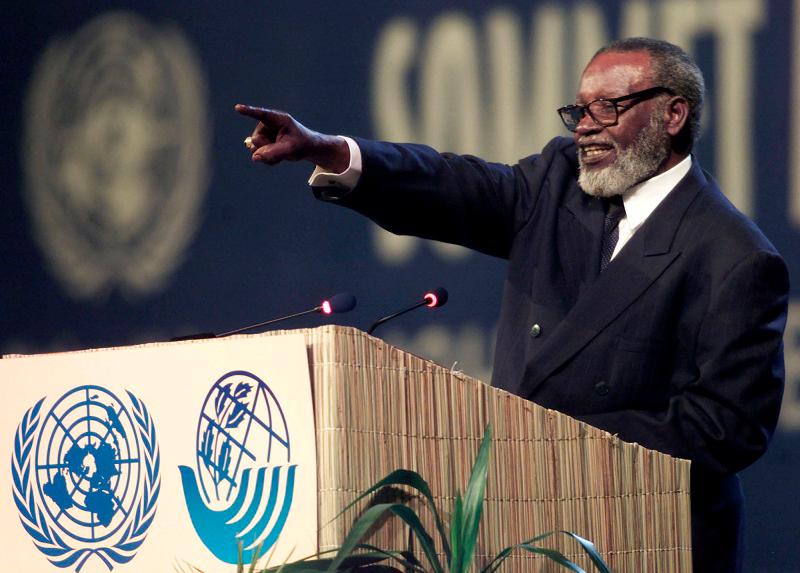WINDHOEK: Sam Nujoma, the activist and guerrilla leader who became Namibia's first democratically elected president after it won its independence from apartheid South Africa, died aged 95 on Saturday, the Namibian Presidency said on Sunday.
Nujoma rose to head the thinly populated southern African country on March 21, 1990 and was formally recognised as “Founding Father of the Namibian Nation” through a 2005 act of parliament.
The acclaim was balanced out by domestic and international criticism over his intolerance of critical media coverage, his railing against homosexuality and over the 1998 constitutional amendment that let him run for a third term.
He was a longtime ally of Zimbabwean strongman Robert Mugabe, backing Mugabe’s land seizures from white farmers, though at home Nujoma stuck to a “willing buyer, willing seller” policy.
“The foundations of the Republic of Namibia have been shaken,“ the presidency posted on X.
“Our venerable leader, Dr. Nujoma did not only blaze the trail to freedom – but he also inspired us to rise to our feet and to become masters of this vast land of our ancestors.”
The presidency said Nujoma had been hospitalised for medical treatment over the past three weeks, adding: “Unfortunately, this time, the most gallant son of our land could not recover from his illness.”
COMPLEX LEGACY
Nujoma served his three terms as president from 1990 to 2005 and sought to project himself as a unifying leader bridging political divides.
In a country scarred by the legacy of apartheid and German colonial rule, Nujoma’s SWAPO party oversaw a national reconciliation programme under the motto “One Namibia, One Nation”.
In his speeches, Nujoma made a point of repeating the phrase: “A united people, striving to achieve a common good for all members of the society, will always emerge victorious.”
His achievements included establishing democratic institutions and prioritising reconciliation, said Ndumba Kamwanyah, a lecturer at the University of Namibia and a political analyst.
But his autocratic tendencies, on display in his treatment of the media and brutal suppression of the 1999 Caprivi rebellion, cast a shadow over his legacy, Kamwanyah added.
“While Nujoma’s presidency was foundational in establishing Namibia’s independence and governance, it was not without flaws,“ Kamwanyah said.
CAMPAIGNER AND GUERRILLA
Nujoma was born in a village in northwestern Namibia in 1929, when his country was under South African administration. South Africa had controlled Namibia since World War One after a brutal few decades of German colonial rule remembered for the genocide of the Herero and Nama people.
As a boy he looked after his family's cattle and attended a Finnish mission school, before moving to the coastal town of Walvis Bay and then the capital Windhoek, where he worked for South African Railways, according to a biography posted on the website of Nujoma's charitable foundation.
Nujoma left his job on the railways to focus his energies on bringing down the apartheid system.
In the late 1950s he became leader of the Owambo People's Organisation, a precursor to liberation movement SWAPO, organising resistance to the forced relocation of Black people in Windhoek that culminated in the police killing 12 unarmed people and wounding dozens more.
Nujoma was charged with organising the resistance and arrested. In 1960, he went into exile. He travelled across Africa before reaching the United States, where he petitioned the United Nations for Namibia's independence.
Made SWAPO leader in absentia, Nujoma established its armed wing and in 1966 launched a guerrilla war against the apartheid government.
It took more than a decade of pressure from Nujoma and others before a U.N. Security Council resolution in 1978 proposed a ceasefire and elections, and another decade for the ceasefire deal to be signed and elections held in late 1989.
SWAPO won a majority in those elections, and Nujoma took office in March the following year.









